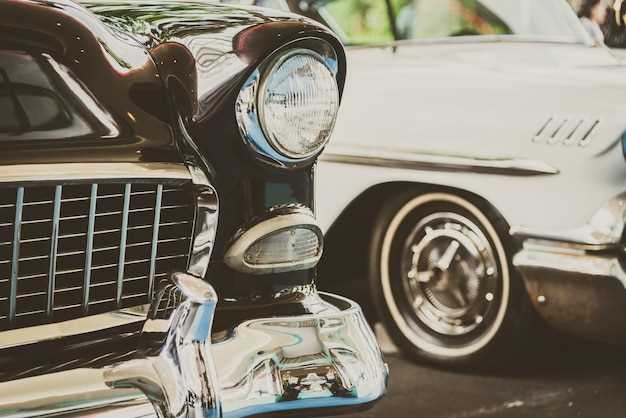
Buying a muscle car at an auction can be an exhilarating experience, offering a chance to own a piece of automotive history. However, navigating the auction process requires knowledge and caution to ensure that you make a wise investment. Whether you are a seasoned collector or a first-time buyer, understanding the ins and outs of purchasing a vehicle at auction is crucial.
Before placing a bid, it’s essential to do your homework. Research the specific make and model of the muscle car you are interested in, and familiarize yourself with its values and common issues. This understanding will empower you to identify a good deal when you encounter it at an auction. Moreover, inspecting the car in person, if possible, can provide valuable insights into its condition, as photographs might not capture all the details.
The auction environment can be fast-paced and high-pressure, which is why setting a clear budget beforehand is vital. This will help you avoid overspending in the heat of the moment. Additionally, consider participating in an auction that allows you to review the vehicle’s history and obtain a detailed condition report. Remember, knowledge is your best ally when navigating the thrilling world of muscle cars at auction.
Researching Auction Houses and Their Reputation
Before participating in a muscle car auction, it’s crucial to research auction houses to ensure a safe and successful bidding experience. The reputation of the auction house can significantly impact your purchase. Here are some key points to consider:
- Check Reviews and Ratings: Look for online reviews and ratings from previous bidders. Websites, forums, and social media can provide insights into the experiences of others.
- Verify Accreditation: Ensure the auction house is part of recognized organizations within the automotive and auction industry. Membership in associations adds credibility.
- Examine Past Auction Results: Review results and statistics from previous auctions. This information can help gauge the quality and value of the cars sold, as well as the auction house’s ability to attract serious buyers.
- Ask for Recommendations: Speak with fellow muscle car enthusiasts and collectors. Personal recommendations can lead you to reputable auction houses that are trusted by the community.
- Inspect the Auction Catalogue: A transparent and detailed auction catalogue showcases the cars available, including their condition, history, and estimated values. A reputable auction house will provide thorough descriptions.
In addition to these steps, consider visiting the auction house in person if possible. Observing their operations and meeting the staff can help you assess their professionalism and knowledge. By conducting this research, you can enter the bidding process with confidence, knowing you are dealing with a reputable auction house.
Understanding Bidding Strategies for Muscle Cars
When participating in an auction for muscle cars, it is essential to have a well-defined bidding strategy to secure your desired vehicle at a reasonable price. The first step is to conduct thorough research on the specific model you are interested in. Understand its market value, common issues, and the rarity of the car. This background knowledge will empower you during the bidding process, allowing you to make informed decisions and avoiding overbids.
Another important strategy is to set a strict budget before the auction begins. Determine your maximum bid limit, taking into consideration additional costs such as auction fees, taxes, and transportation. Sticking to this budget will prevent impulse bids that could lead to overextending your finances.
During the auction, observe the bidding behavior of others to gauge their enthusiasm and intent. Sometimes, waiting until the last few moments of bidding can be advantageous. This approach may help in detecting hesitant bidders, giving you the upper hand to place a winning bid at a critical moment without exhausting your budget prematurely.
It is also wise to consider using proxy bidding if available. This method allows you to set your maximum bid in advance, enabling you to participate without being caught up in the auction’s excitement. Additionally, familiarize yourself with the auctioneer’s style. Some auctioneers may favor faster-paced sales, while others might linger, which can affect your bidding strategy.
Finally, be prepared to walk away if the bidding exceeds your budget. Emotion can cloud judgment in the heat of the moment, but maintaining discipline is crucial. Remember, there will always be other auctions and opportunities to find the muscle car that fits your needs at a price you can afford.
Inspection Tips for Evaluating Muscle Cars
When attending an auction for muscle cars, a thorough inspection is crucial to ensure you make a wise investment. Begin with a detailed examination of the exterior. Look for any signs of rust, dents, or uneven paint that may indicate previous accidents or poor repairs.
Next, check the car’s interior. Assess the condition of the seats, dashboard, and other components. Look for signs of wear and tear, such as cracked leather or faded surfaces. Ensure that all electrical components, including the lights, gauges, and sound system, are functioning correctly.
Evaluate the engine bay. Look for leaks, corrosion, or any aftermarket modifications that could affect performance. Pay attention to the engine components, such as the belts and hoses; these should be in good condition without signs of cracking or excessive wear.
Verify the vehicle’s VIN (Vehicle Identification Number) to ensure it matches the title and any documentation provided at the auction. This step is essential for verifying the car’s history and originality.
It’s also advisable to inspect the undercarriage. Check for signs of rust or damage that may not be visible from the top. Ensure the chassis is sound, as structural integrity is vital for both safety and performance.
Finally, if possible, take the car for a test drive. Pay attention to how it handles, accelerates, and brakes. Listen for any unusual noises that could indicate mechanical issues. This firsthand experience can provide insights that visual inspection alone may not uncover.
Setting a Budget and Stick to It During Bidding

Before you participate in an auction for a muscle car, it’s essential to set a clear budget. Determine the maximum amount you are willing to spend, considering not only the auction price but also additional costs such as taxes, fees, and potential restoration expenses. This initial figure should be grounded in your financial situation and the market value of the car you desire.
Once you establish your budget, discipline becomes vital during the bidding process. Auctions can be exciting and emotionally charged, which may lead you to drift from your predetermined limit. Stay focused on your goal and resist the temptation to get caught up in bidding wars, as this can quickly result in overspending.
Using a bidding strategy can help maintain your budget. For instance, decide in advance how much you are willing to bid in increments. If you reach your set limit, walk away from the auction confidently. Understanding that there will always be other opportunities to buy a muscle car can alleviate the pressure to exceed your budget in the heat of the moment.
Lastly, consider bringing a trusted friend or advisor to the auction. They can provide perspective and remind you of your financial boundaries, helping to keep your focus on smart buying. Remember, sticking to your budget not only ensures a sound investment but also enhances your overall experience in the auction environment.
Ensuring Proper Documentation and Title Transfer

When purchasing a muscle car at auction, proper documentation and title transfer are critical steps to ensure you receive a legitimate and valuable vehicle. Always verify that the seller is the legal owner and has the right to sell the car. This minimizes the risk of disputes later on.
Before participating in the auction, request to see the car’s title. The title must be clear, indicating that there are no liens or outstanding loans on the vehicle. A clear title simplifies the transfer process and protects you from future claims on the car.
Make sure to confirm that the Vehicle Identification Number (VIN) on the title matches the VIN on the vehicle itself. Discrepancies here can signal potential issues, such as stolen vehicles or incorrect registrations.
During the auction process, document all transactions and communications related to the purchase. Keep track of any agreements made and ensure that the payment methods are traceable. Always ask for a receipt or bill of sale once the transaction is complete.
After the auction concludes, follow these steps for proper title transfer:
| Step | Description |
|---|---|
| Verify Ownership | Check that the seller’s name matches the name on the title. |
| Complete Title Transfer | Both buyer and seller must sign the title, completing the transfer legally. |
| Fill Out Additional Paperwork | Depending on your state, you may need to fill out further forms for registration. |
| Submit to DMV | Visit your local DMV to submit the title and paperwork for a new registration. |
If you encounter any issues with the title or documentation during the auction process, do not hesitate to walk away. Protecting your investment begins with ensuring everything is in order from the start.
Post-Auction Considerations for Muscle Car Ownership
After successfully purchasing a muscle car at auction, it’s crucial to address several key considerations to ensure a smooth ownership experience. First, evaluate the auction documentation you received, including the title and any service records. Confirm that all paperwork is accurate and complete, as this will be essential for registration and potential resale.
Next, conduct a thorough inspection of the vehicle. Even if you assessed the car during the auction, now is the time to scrutinize it closely. Check for any hidden damages or maintenance needs that may not have been apparent. Consider hiring a qualified mechanic who specializes in muscle cars to perform a detailed evaluation, ensuring that your new investment is in optimal condition.
Secure appropriate insurance for your muscle car. Not all policies cover classic or performance vehicles adequately, so seek out providers experienced in classic car insurance. Ensure that your policy aligns with your usage plans, whether you intend to drive it regularly or store it as a collectible.
Understand the maintenance requirements unique to muscle cars. Unlike regular vehicles, these classic machines often demand specialized knowledge and parts. Develop a relationship with a trusted mechanic who understands the nuances of muscle car mechanics and can provide necessary servicing and repairs.
Finally, consider joining a community of muscle car enthusiasts. Connecting with other owners can offer valuable insights, tips, and support. Engage with local car clubs or online forums to share experiences and learn about events such as car shows and cruises, helping you enjoy your new muscle car to the fullest.




